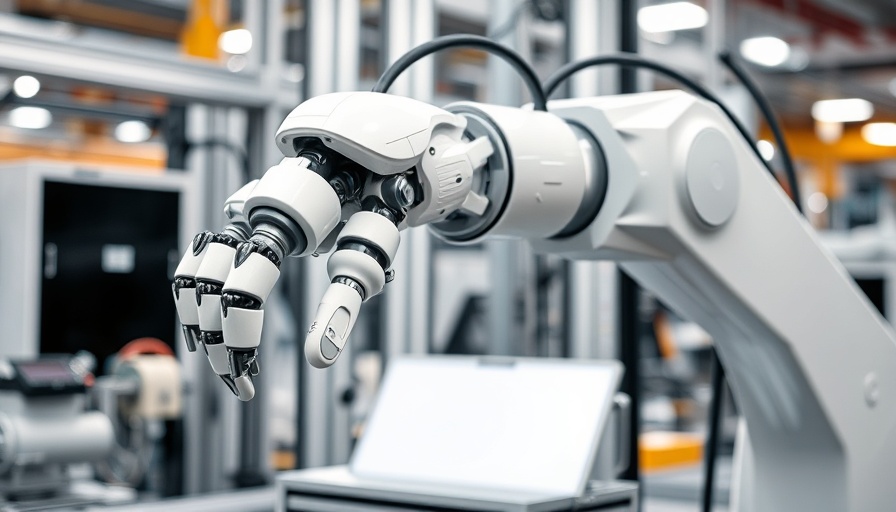
The Rise of Robotic Automation: A New Frontier
As industries face unprecedented challenges and transformations, robotic automation emerges as a beacon of change. Embracing this technology not only streamlines operations but also reshapes job roles and workplace dynamics. The transition from traditional methods to automated processes signifies a shift in how businesses function and adapt to an increasingly competitive landscape.
Understanding Robotic Automation: More than Just Robots
Robotic automation can be categorized broadly into two areas: Industrial Automation and Robotic Process Automation (RPA). Industrial Automation commonly refers to physical robots performing tasks on factory floors, whereas RPA encompasses software bots that manage digital workflows. This duality highlights the extensive reach of automation, extending beyond manufacturing into sectors like healthcare, finance, and agriculture.
Why Does Robotic Automation Matter?
The value of robotic automation lies in its myriad benefits:
- Increased Efficiency: Robots can operate continuously, enhancing production rates.
- Precision: Automated systems significantly reduce human error, ensuring product quality.
- Cost-effectiveness: While setup costs are considerable, the long-term savings often outweigh initial investments.
- Safety: By undertaking dangerous tasks, robots protect human workers from hazards.
- Scalability: Systems are adaptable to evolving production demands.
Real-World Applications: Where Automation Thrives
Across various sectors, robotic automation integrates seamlessly into daily operations:
- Manufacturing: Robotics are essential for assembly lines, ensuring precision and speed.
- Healthcare: Automated systems facilitate surgeries and manage patient data efficiently.
- Retail: Advanced inventory management and automated checkout systems improve consumer experience.
- Finance: RPA enhances processes like fraud detection, loan processing, and compliance.
- Agriculture: Robotics transform traditional farming methods, introducing smart technologies for crop management.
Challenges in the Path of Progress
Despite the promise of robotic automation, several challenges must be addressed:
- Job Displacement: As automation replaces routine tasks, workers may face job loss, prompting a need for retraining.
- High Costs: Implementation requires significant investment, which may be burdensome for small businesses.
- Security Risks: Automated systems present vulnerabilities, especially in a hyper-connected world prone to cyber threats.
- Complex Implementation: Successful automation requires thorough planning and bundling with existing infrastructure.
The Future of Work: Automation's Expanding Role
As technology evolves, the future of work is poised for change. Automation will increasingly integrate into our daily lives, influencing both job design and worker experience. With ongoing advancements in artificial intelligence (AI) and the Internet of Things (IoT), businesses must adapt to harness the potential of these technologies.
Decisions Inspired by Automation Opportunities
Understanding the dynamics of robotic automation provides essential insights into future workforce strategies. Businesses must prioritize reskilling initiatives to adapt to the changing landscape. Moreover, leveraging automation tools can enhance work-life balance by freeing employees from monotonous tasks and empowering them to focus on strategic, creative roles.
Risk Factors and Navigating the Challenges
Recognizing the risks associated with automation is important for both employees and employers. Addressing concerns regarding job security and ensuring that ethical considerations are maintained will be pivotal for fostering a harmonious working environment. Workers armed with new skills will be essential for navigating this evolving landscape.
Your Role in the Automated Future
As robotic automation continues its ascent, remaining informed and adaptable is key for everyone engaged in the workforce. Whether you’re an employer implementing technology or an employee evolving with it, your proactive engagement will shape the automated future.
In summary, robotic automation presents a unique opportunity for industries to thrive in the face of modern challenges. Embracing this transformation requires a commitment to continuous learning and a willingness to adapt, ensuring a prosperous and innovative future for all.
 Add Row
Add Row  Add
Add 




 Add Row
Add Row  Add
Add 

Write A Comment